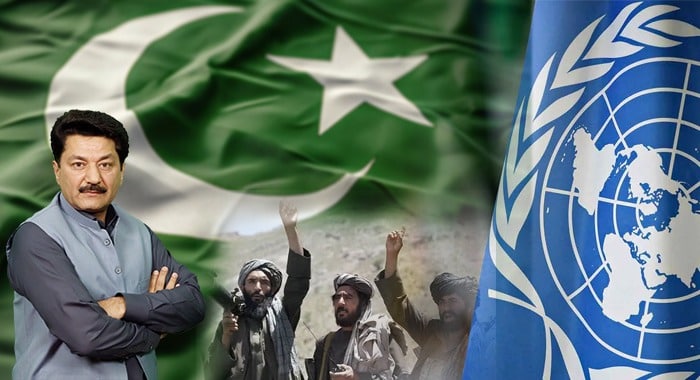Fida Adeel
In a world where perceptions often triumph over facts, and narratives are shaped more by political convenience than objective truth, Pakistan’s appointment as Vice President of the United Nations Security Council’s (UNSC) Counter Terrorism Committee (CTC) is nothing short of a diplomatic masterstroke. It marks a decisive shift from being unfairly labelled as a source of terrorism to becoming a global stakeholder in counter-terrorism policy making. For decades, Pakistan has been at the receiving end of accusations, particularly from India, which has sought to project it as a safe haven for militant groups. These allegations ranging from harbouring state-sponsored terrorism to shielding fugitives have dominated diplomatic discourse. Yet, while India’s narrative has been loud and persistent, it has not always been substantiated by concrete evidence. In contrast, Pakistan, often silent but resolute, has allowed its actions and sacrifices to speak louder than rhetoric.
Pakistan’s appointment to this prestigious position at the UNSC CTC is a vindication of its two-decade-long war against terrorism. From the rugged terrains of Swat and Waziristan to the urban centres of Karachi and Peshawar, the country has bled, fought, and endured. According to recent figures, over 745 people were either martyred or injured in terrorism-related incidents in Khyber Pakhtunkhwa alone during just the last five months. These are not just statistics they represent the price Pakistan has paid for global peace.
Unlike many countries that pontificate on counter-terrorism from afar, Pakistan’s experience is lived and painful. It has dismantled terrorist networks, carried out military operations such as Zarb-e-Azb and Radd-ul-Fasaad, invested heavily in intelligence-based operations, and faced retaliatory violence from militants who target it precisely because of its resolve. The blood of its civilians, soldiers, and police personnel has nurtured the soil on which this global recognition now grows.
India’s External Affairs Minister S. Jaishankar continues to pursue an aggressive foreign policy that includes isolating Pakistan on the international stage. Yet, the fact that Pakistan has not only weathered these diplomatic offensives but emerged stronger and more credible speaks volumes. In stark contrast to Jaishankar’s shrill posturing, Bilawal Bhutto Zardari has led a more measured, confident, and composed diplomatic campaign. By calling Prime Minister Narendra Modi a “cheap copy” and simultaneously offering intelligence-sharing cooperation with India, Bilawal has turned the tables. His remarks, while provocative, underline a deeper strategic message: Pakistan is willing to fight terrorism wherever it exists, even inside Indian territory if India has the courage to collaborate rather than accuse.
This statesmanship is not lost on the international community. Social media is awash with comparisons between Pakistan’s focused diplomacy and India’s photo-op driven delegations abroad. Indian media’s visible frustration following Pakistan’s UNSC success is perhaps the clearest indicator of who really won the diplomatic battle. Pakistan’s growing ties with China and Afghanistan, especially in the realm of counter-terrorism intelligence-sharing, further bolster its credentials. At a time when Beijing seeks regional stability for its ambitious Belt and Road Initiative, Pakistan’s credibility as a regional stabiliser is more important than ever.
In addition to the CTC vice presidency, Pakistan has also been entrusted with chairing another UNSC committee tasked with overseeing the implementation of sanctions on the Taliban. This development signals increasing trust in Pakistan’s ability to navigate complex regional dynamics and act as a responsible intermediary particularly in the evolving post-Doha Afghan context. Importantly, while this Taliban-related committee is a monitoring not decision-making body, its chairmanship is a nod to Pakistan’s strategic relevance in South-Central Asia. The exchange of ambassadors between Islamabad and Kabul, along with Pakistan’s careful diplomacy toward the Taliban government, is gradually restoring bilateral equilibrium.
Some may view this vice presidency as largely symbolic. That would be a mistake. The UNSC Counter-Terrorism Committee deals not just with South Asian militancy but with global threats—ranging from Al-Qaeda and ISIS to lone wolf attacks in Europe and the U.S. Pakistan, as Vice President, will help set global counter-terrorism agendas, contribute to resolutions, and scrutinise member states’ compliance with counter-terrorism frameworks. This role means Pakistan will have a say in shaping responses to international terrorism, influencing decisions not just in the region but globally. It allows Islamabad to reposition itself as a thought leader on terrorism not merely a state reacting to it.
All of this comes as Pakistan continues to internationalise the Kashmir issue often met with resistance due to India’s global economic clout. But incidents like the Peshawar blast, and the growing archive of evidence linking Indian intelligence to destabilizing activities in Balochistan and elsewhere, are beginning to force a reevaluation of New Delhi’s own track record. Pakistan’s repeated offers to present its evidence before international forums be it regarding the Jafar Express sabotage or the activities of RAW in Balochistan have been consistently ignored by India. The reason is obvious: New Delhi knows the narrative may crumble under scrutiny.
Pakistan’s ascension to the vice presidency of the UNSC Counter-Terrorism Committee is more than a diplomatic headline it is a moment of reckoning. It is a challenge to outdated narratives, a rebuttal to malicious propaganda, and a recognition of a country that has sacrificed immensely in the pursuit of peace. For once, Pakistan has been acknowledged not for what others claim it is, but for what it has truly done. The world would do well to recognize that Pakistan is not part of the problem it is central to the solution.





